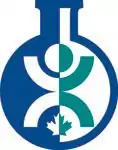 Logo | |
| Abbreviation | CSCC |
|---|---|
| Formation | 1956 |
| Type | Professional Association for clinical chemists |
| Purpose | The CSCC provides leadership in the practice of clinical biochemistry and clinical laboratory medicine through service, education, and research. The Society establishes standards for diagnostic services and serves as a resource to government, industry, and healthcare associations, in the interest of the general public. |
| Headquarters | Kingston, Ontario, Canada |
Region served | Canada |
Official language |
|
President | Ted Dunn |
| Website | Official website |
The Canadian Society of Clinical Chemists (CSCC) is a nonprofit, national, scientific, and professional society that represents clinical chemists (also known as clinical biochemists) across Canada. The organization's purpose is to advance the practice of clinical chemistry in Canada through the promotion of importance in education, research, and practice, utilizing activities at the international, national, provincial, and local levels.
In Canada, clinical chemists are members of the medical laboratory management team, which consists of pathologists, laboratory managers, and senior technologists. They are primarily responsible for setting the standards of performance for the clinical biochemistry laboratory. The knowledge they acquired from post-doctoral training programs is applied to maintain efficiency in the lab.
They monitor the quality of the testing services and act as technical experts to evaluate and select methods and instrumentation. They apply clinical and technical knowledge to assist physicians with the selection and interpretation of tests and to support the research and teaching activities of the laboratory.
History
The founding meeting for the CSCC was held in Montreal, Quebec on October 17, 1956.[1] Since that time the membership has grown to several hundred clinical chemists. Highlights of the society's accomplishments during its first 50 years were documented by Dr. Arlene Crowe (past president) in Clinical Biochemistry.[2] In 1986 the Canadian Academy of Clinical Biochemistry was established as the academic body of the CSCC to oversee training, certification, accreditation, and professional development of clinical chemists in Canada. A syllabus for post-doctoral training in clinical biochemistry was developed and is maintained by the CACB as a guide to program directors and trainees.[3]
Activities
The CSCC holds an Annual Scientific Congress and Annual General Meeting. The 61st annual CSCC conference was held in San Diego, CA, USA July 31-August 4, 2017 as a joint meeting with the AACC. Publications include the scientific journal Clinical Biochemistry,[4] a member newsletter CSCC News, and position papers on current issues such as cardiac troponin testing.[5] Special interest groups have been developed to advance knowledge and produce solutions in Clinical Toxicology, Point-Of-Care Testing, Pediatric and Perinatal Biochemistry, Monoclonal Gammopathy, Auto verification of test results, and the Canadian Laboratory Initiative on Paediatric Reference Intervals - CALIPER.
The CSCC is a full member of the International Federation of Clinical Chemistry and Laboratory Medicine (IFCC), which is associated with the International Union of Pure and Applied Chemistry (IUPAC).
References
- ↑ Scientific and Technical Societies of the United States and Canada. National Academies. 1961. pp. 1. NAP:00050.
- ↑ Arlene J. Crowe (2006). The Canadian Society of Clinical Chemists: highlights of its first 50 years. Clin Biochem 2006; 39(5):427-43. Elsevier Science.
- ↑ Canadian Academy of Clinical Biochemistry (2013). Syllabus for Post Doctoral Training in Clinical Biochemistry (PDF). CACB.
- ↑ "Clinical Biochemistry". ScienceDirect.
- ↑ Peter Kavsak; et al. Cardiac troponin testing in the acute care setting: Ordering, reporting, and high sensitivity assays - An update from the Canadian Society of Clinical Chemists (CSCC). Clinical Biochemistry 44 (2011) 1273-1277.